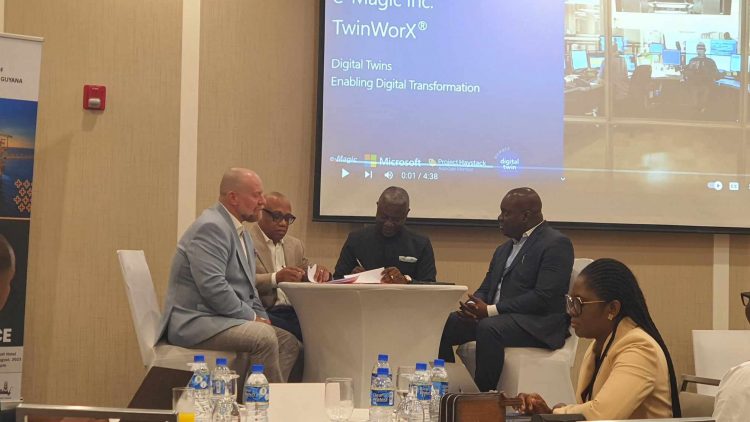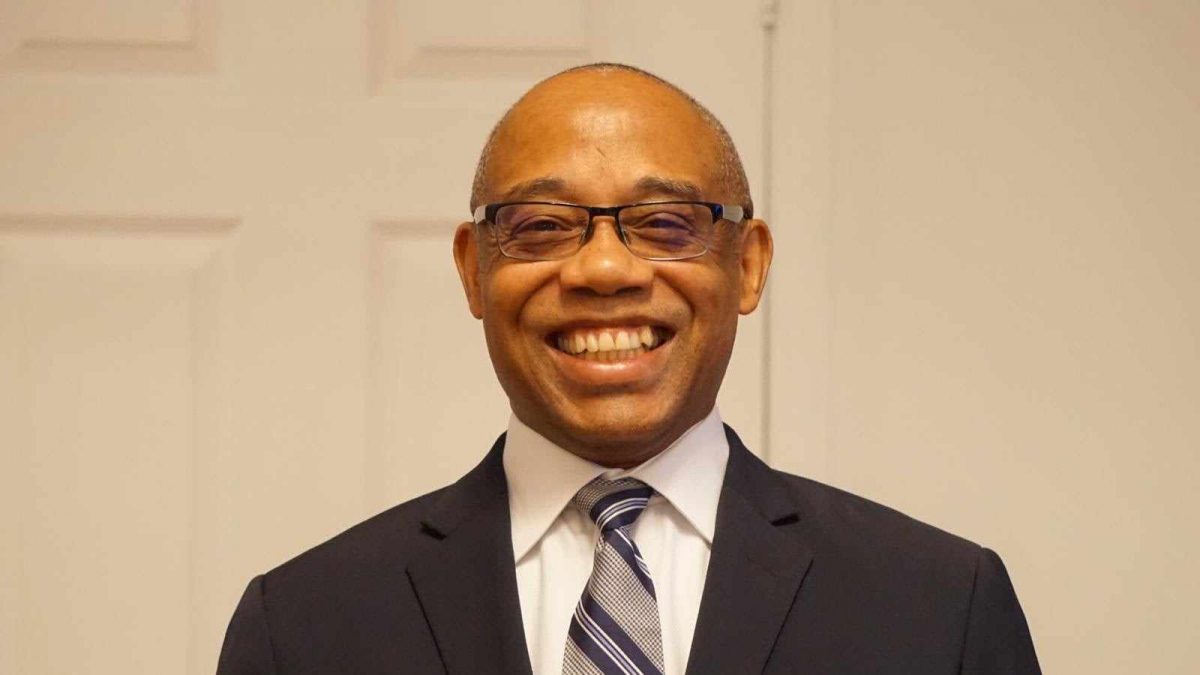Promising to not only train locals to take over and “revolutionize” monitoring of the extraction of their country’s oil and gas, local tech company, e-Magic, on Friday entered into a partnership with Ghanaian-based West Coast Gas for over US$10 million in the short term.
“We are bringing technology that is used globally to Guyana. We are going to be training locals to apply this technology and support its implementation. That is for the upskilling. In addition to that, we are providing the ability to monitor oil and gas operations and identify gaps, so as to provide benefits to the country,” Chief Executive Officer of e-Magic Guyana, Compton Harris, told the Sunday Stabroek following the signing.
“My intention, is to have the people who are skilled – computer engineers, data engineers… experts, to be able to use them in my organisation for projects outside of Guyana,” he added.
Harris, a computer engineer who has studied in Canada and built the engineering consulting and system integration company, e-Magic Canada, with his “college buddy” Eugene Woo, said that it has always been his dream to give back to his native country and in this way that goal can be realised. Having had to outsource human resources from countries like India, Costa Rica and Ukraine, over the years, Harris pointed out that when locals are trained, he can now use this group for the contracts his companies obtain worldwide.
“From 1988 we have been working with technology. We have resources in India, the United Kingdom, Canada, and throughout the United States. So now we are building capacity, where that will service the industry in Guyana should the need be. But because the technology which we use is very specific, by building capacity here I intend to use that which we have [here]. I am creating a pool so we would not have to outsource from those countries and that brings additional work to Guyanese,” he explained.
“I must add that when we outsource, we still had to train the people in India, Costa Rica… so us equipping Guyanese gives us the ability to create another pool in Guyana which can be used internationally,” he added while pointing out that Guyanese are some of the quickest hands-on learners.

And as he emphasised the importance of local content, Harris pointed out that e-Magic Guyana will ensure all the regulatory requirements are met and will continuously work with the Local Content Secretariat, government, the private sector, and locals, to ensure that citizens of this country benefit from the partnership as it was not formed just for making profits.
Shared vision
West Coast Gas CEO, Emmanuel Johnson, said that the two companies’ “shared vision is to leverage our respective strengths to provide the Government of Guyana with visibility to real time oil production data.”
He echoed much of what they had told the Stabroek News about the operation back in June, during a visit to their office in Accra, even as he emphasised that “together with e-Magic, we will redefine how technology can enhance production processes, minimise risk, and derive sustainable growth.”
While ExxonMobil will have its own monitoring facility at its Ogle, East Coast Demerara headquarters, the government has underscored the importance of independent real-time monitoring (RTM) of this country’s oil and gas resources and will ensure simultaneous oversight through an independent company.
Minister of Natural Resources Vickram Bharrat had told the Stabroek News that Guyana will be implementing independent observation and analysis processes, similar to that being carried out in Ghana and other countries, for both crude oil production, and gas supplied to the Wales gas-to-shore plant on the West Bank Demerara. “This is the objective for future monitoring. We are working to strengthen all the regulatory frameworks to include monitoring,” he said, while noting that strengthening the Environmental Protection Agency’s capacity is also being actively pursued.
During a tour of the facility, the company’s CEO had explained that while there is mutual trust between governments and international oil companies, countries will want to have safeguarding measures to ensure that what the oil companies report as being produced, correlates with the governments’ independent figures.
“Crude oil and natural gas resources can be a major source of revenue for a nation. Monitoring these resources enables the government to validate the accuracy of production estimates, assess well performance, production levels, distribution, and consumption of these resources, track production volumes and sales reported by oil and gas exploration and production companies, ensuring that the country receives its fair share of revenue [taxes and royalties] from these resources. This would prevent the underreporting of volumes and impede unauthorised extraction, reducing the risk of income loss due to illegal operations [flaring restrictions]. This data would also aid in resource management aimed at making evidence-based decisions about production levels, export volumes, and long-term resource development plans,” Johnson had explained.
From a strict access-controlled room, Johnson, one of Ghana’s top chemical engineers, pointed out that the process which involves the acquisition and aggregation of sensor data that are transmitted in a secure format to a data centre for processing, is manned by locals who were trained by the company. Back-end encryption and the monitoring of privileged account access are also part of the tiered security measures to safeguard data collected and Johnson believes that even if an employee gets some information or if there is hacking, there is not much anyone can do with the data.
On the process itself, he related, “Real-time remote monitoring entails collecting and analysing data from both onshore and offshore facilities in real-time using data transfer and transmission technologies. At the site or field being monitored, several sensors and monitoring devices are installed for data acquisition. Parameters such as flow rates, pressures, temperatures, and quality and or composition of data, are remotely measured and transmitted to a data monitoring centre for monitoring. Monitoring devices and sensors are installed at wellheads, along pipelines, at metering stations, storage facilities, refineries, and other appropriate sites, to allow for remote monitoring.”
‘Boost’
Both companies pointed out that their partnership is “a significant milestone in the world of technology-driven solutions for the oil and gas sector.”
“The JV [joint venture] is a realization of the vision laid out in the strategic partnership agreement signed by the two countries in December 2021 and it brings together the deep technical knowledge and international experience of both e-Magic Inc. and West Coast Gas Ghana,” a joint statement stated.
“The JV is a significant boost for Guyana’s local content policy as it represents a competitive, combined force of proven expertise with local participation for the delivery of a cutting-edge technological solution, which will allow the Government of Guyana to independently monitor the production of hydrocarbons from its oil and gas fields. Their solution would enable the Government of Guyana (GoG) to have (i) direct and independent oversight within the natural resources sectors; and (ii), real time data enabling GoG to build its own review capability. The Local Content Act of 2021 does not even include this service as one of the 40 captured under the law, making the JV unique,” the statement added.
It explained that the capital for the joint operations will be funded by West Coast Gas Ghana, and the Guyanese company will be responsible, among other things, for the recruitment of nearly all the staff. “The JV will also see their combined technical and technological capabilities contributing to building a robust local content participation in the project. At least 75 per cent of senior management of the JV company will be Guyanese and over 90 per cent of the staff to be employed by the joint venture will also be Guyanese. The Private Sector Partners will also be responsible for providing technical and operational training to the Guyanese employees so they will be equipped with all the necessary knowledge and skills ready for when the project commences operation.”
Further, “The two Private Sector Partners have, through their respective areas of expertise and businesses, have implemented large-scale projects for governments in Africa and other parts of the world across these segments, providing turn-key designed solutions in the energy and technology sectors with in-built finance keys to governments to ensure that states receive, in a transparent and accountable manner, their due benefits from natural resources as anticipated by the laws and contracts governing the same.”
The President and CEO of e-Magic, whose experience profile spans some four decades said, “We are confident that by combining our TwinWorX digital twins platform and deep technical expertise, and West Coast Gas Ghana’s in-depth industry knowledge we will provide a comprehensive monitoring capability that will revolutionize how Guyana monitors its booming oil production. Our joint venture aims to set new standards for efficiency, transparency, and sustainability in this vital sector.”
On e-Magic’s website, its profile says that over the past decade, the company “has created global partnerships by leveraging its technological resources and expertise to achieve growth and build out best-in-class solutions. We are a Microsoft partner, ground breaking member of the Digital Twin Consortium, and associate member of the Project Haystack Organization. These partnerships have allowed us to gain expansive knowledge and best practices across industries.”
“As more organizations embrace technology, industries are looking for innovative ways to monitor, visualize, control and optimize their operations. e-Magic’s solutions allow clients to engage in a proactive approach to facility and asset management which results in a simplified operation, enhanced execution, improved efficiencies and reduced overall costs. Our analytic processes also help clients optimize energy resources, enhance asset performances and provide new levels of insight to improve interoperability of their systems,” it added.






